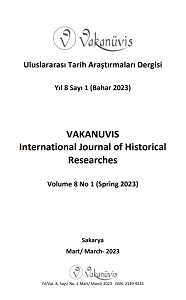Osmanlı Döneminde Ziraat Bankası’nın Tarım Dışı Uygulamaları
Non-Agricultural Functions of the Agricultural Bank in the Ottoman Period
Author(s): Şeyma DereciSubject(s): Agriculture, 19th Century, Pre-WW I & WW I (1900 -1919), The Ottoman Empire
Published by: Serkan YAZICI
Keywords: Abdulhamid II; The Agricultural Bank; The Benefit Funds; The Hecaz Railway;
Summary/Abstract: As a kind of agricultural fund, the Homeland Funds (the Memleket Sandığı) and the Benefit Funds (the Menafi Sandığı) formed the basis for the establishment of the Agricultural Bank (Ziraat Bank) which was a continuation of these funds, also took over the essential duties, rights and responsibilities of the funds it replaced when it was founded in 1888. Due to the abuses and a large of the funds’ capital were spent outside of agricultural production and instead of supporting the needy farmers. Therefore, the Ziraat Bank replaced the funds in order to prevent all these and it was clearly emphasized that no monetary aid will be given to any person or enterprise other than agricultural activities in the Ziraat Bank’s establisment regulations. However, when we look at the later applications, it is understood that it functioned not only as an agricultural bank, but also as a state bank. In other words, until the period when the legal basis for the bank's involvement in non-agricultural areas was established with the law of 1916 and the definition of debtor was expanded to non-agricultural areas, it also undertaken the duties other than supporting agriculture. It became an intermediary institution on behalf of the state by undertaking duties such as financing of public works, education, tax collection, etc.; it also spent its funds according to the political attitude of the state and the priorities of the government.
Journal: Vakanüvis- Uluslararası Tarih Araştırmaları Dergisi
- Issue Year: 8/2023
- Issue No: 1
- Page Range: 415-458
- Page Count: 44
- Language: Turkish

